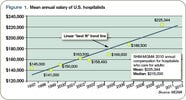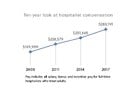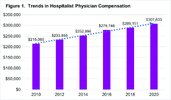Just to add a little to this...
Everyone here uses CPT codes: 99223, 99291, 99205, etc. Many CPT codes have a facility and non facility value (facility meaning a hospital, SNF, ASC, LTACH, etc. NOT the office). If something is done in a facility, the practice expense RVU is much lower and gets replaced with a facility fee. What facility a service takes place in is determined by the place of service (POS) code. you can see all the codes
here. What makes some people jaded is that rendering the same service utilizing the same resources can have WILDLY different payments depending on the POS code. A common example that you may have seen in the news is a private PCP who gets bought out by the local hospital system. The PCP's office can now be converted to POS 22, hospital outpatient department (HOPD).
This results in a much higher reimbursement and probably a higher cost to the patient. there is no way you can access this extra money without being a hospital, even though nothing has changed in the PCP's clinic. For similar reasons, some hospital employed physicians can get a much higher salary than is otherwise possible grinding out FFS.
This isn't fair you might mutter to yourself. Damn right it isn't.
Managed care insurance (i.e. private insurance) is usually expressed as % of Medicare. Usually it is 100+%, but if you are an individual physician it can be even 80% medicare, which sucks. pays to be part of a group, especially a multispecialty group. Finally, medicaid payment is embarrassingly bad. In the 4 states where I know the rate, you literally lose money by seeing medicaid patients. doesn't even cover overhead.




